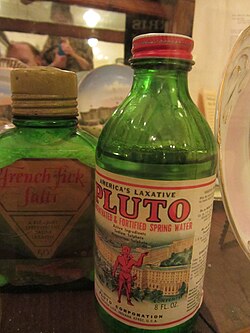
Pluto Water was a trademark for a strongly laxative natural water product which was marketed in the United States in the early 20th century. The water's laxative properties were from its high native content of mineral salts, with the active ingredient listed as sodium and magnesium sulfate, which are known as natural laxatives. The water's high native content of mineral salts generally made it effective within one hour of ingestion, a fact the company emphasized in their promotional literature. Company advertisements stated the laxative was effective from a half-hour to two hours after ingestion. In 1919, it took 450 railroad cars to transport the bottler's output. [1]







